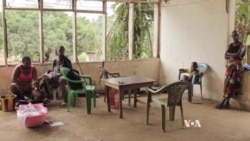March 5 was a big day in Beatrice Yardolo’s life: She was discharged from a Chinese-run Ebola treatment center in Monrovia.
"There were whole lot of journalists – people from different medias, you know, there, getting information from me," she recalled.
Government officials, diplomats, the media – everyone wanted to see the woman who'd been declared and widely celebrated as Liberia’s last Ebola patient.
As it turns out, that designation was premature.
Liberians had started counting down 42 days, the period that has to go by without a single new infection until the World Health Organization can declare a country Ebola-free. But on March 20, 15 days after Yardolo's release, Monrovia’s Redemption Hospital took in and then transferred a female patient. She was diagnosed with Ebola.
Liberia had to postpone its victory over the deadly virus.
Victory postponed
Beatrice Yardolo's new designation as Liberia's "almost-last Ebola patient" is compelling, too, a reminder that Liberia has to remain vigilant.
Her own illness started with Steve, her 32-year-old son, who worked at an Ebola treatment center. One day after work in January, when he had already removed his protective suit, he helped a sick woman who had just arrived at the hospital get out of a car.
A month later, her son Elijah was dead and so were two of his siblings. And Yardolo herself came down with the virus.
"If he had not touched that woman with his naked hands, he wouldn’t have gotten sick," Yardolo said of son Steve. "But because he got sick, his sister, his brother, all went around him and touched him. And ... they, too, got into problem. And some of them had to die."
"I’m just grateful to the almighty God for preserving my life," she continued. "Though our children have gone, we’re still grieving. But we try gradually to overcome it. We’re trying to overcome the pain, the sorrow and whatsoever."
Crippling epidemic
Since the outbreak began in West Africa last year, Ebola has killed more than 10,000 people. Liberia was hardest hit, with nearly 4,300 deaths out of just over 9,500 cases.
Ebola not only has shattered families like the Yardolo’s, it has devastated Liberia’s economy, with businesses and trade shut down and the health care system overloaded.
Now, as the infection rate closes in on zero, the government is preparing for a transition so it can resume the development path it was on prior to the Ebola crisis.
Recovery plan
Liberia’s Information Minister Lewis Brown recently told VOA the government’s post-Ebola recovery plan looks first to create jobs and achieve food security by bolstering farming and infrastructure.
The government also is trying to address the bigger issue of jobs for the 70 percent of the population that is under age 35, most of whom have no jobs.
"And this is why a significant pillar in our post-Ebola recovery is to be able to give our young people the skills they need to take advantage of the new development that is part of our new rebuilding effort," Brown said.
The Ebola crisis particularly has focused attention on health care.
"We want to recreate a health system," Brown said. "We’ve started at a small-scale level prior to this outbreak, where you had community participation. You had people going house to house, especially in rural areas, taking on immunization programs in limited ways. Now we must expand that."
Those plans have yet to reach Yardolo, despite her fame as the almost-last Ebola patient. Her family shares a dilapidated house with three other families.
A charity group supplied them with some food. Other than that, they haven’t received any support.
President Ellen Johnson-Sirleaf came to the house, "she said she will send social welfare here," Yardolo said.
But for now, the government is preoccupied with ensuring that Ebola remains contained.





